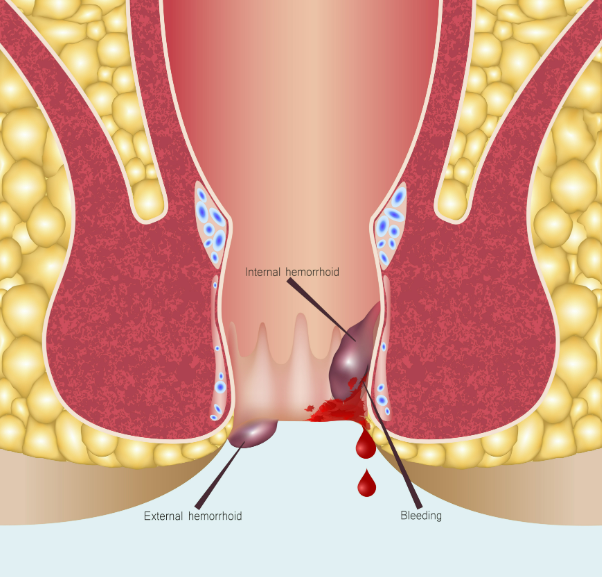Haemorrhoids
Introduction
Haemorrhoids are swollen, inflamed veins in the anal canal. They are a common condition and affect about half of all adults at some time during their lifetime. Haemorrhoids can be caused by increased strain in your bowel movements or constipation. Blood vessels can become varicose (enlarged) or even burst, causing bleeding and pain.

Haemorrhoids (piles) are abnormally enlarged, engorged and/or twisted veins in the anus and rectum.
Haemorrhoids are swollen blood vessels in the anal and rectal area. They may be internal or external, and they can be painful. Haemorrhoids occur when veins in the lower part of your digestive tract swell because they’re being stretched too much.
There are many symptoms that can indicate you have haemorrhoids:
Painless bleeding from the anus during bowel movements is one of the most common symptoms of piles. Small amounts of bright red blood on toilet paper or in stool may also indicate haemorrhoids.
Sometimes you might feel a lump around your anus as well as pain when passing stools or sitting down for long periods of time, especially if you sit on cold surfaces such as porcelain toilets (common in public restrooms).
The ‘RICE’ procedure can be used to treat haemorrhoids that bleed.
The ‘RICE’ procedure can be used to treat haemorrhoids that bleed.
Rest
Ice
Compression
Elevation
It is usually recommended that you try an improved diet first.
It is usually recommended that you try an improved diet first. Dietary changes can help with haemorrhoids and may make other treatments more effective. Avoid foods that are high in fibre and fat, such as wholemeal bread and bran cereals. Drink plenty of water – at least eight glasses a day – but avoid drinking too much alcohol or caffeine as these may cause your stools to be harder and bulkier than normal, which could lead to constipation and bleeding from haemorrhoids. Eat more fruit and vegetables, particularly those rich in vitamin C (such as oranges), which will help strengthen the walls of blood vessels inside the rectum. Avoid spicy foods as these can irritate an already inflamed bowel.
Reducing the amount of straining on the toilet helps haemorrhoids to heal.
There are several ways to reduce straining during bowel movements. The first is to avoid sitting on the toilet for long periods of time. If you can, get up and walk around when you have to go; this will help you empty your bowels faster and with less strain. Another option is to use an over-the-counter product like Daflon, soluble fibre supplements (available at pharmacies), which coats your anus and helps soften stools for easier passage through the rectum.
If you must strain, try doing so slowly and carefully. You too can take little steps as necessary without causing further damage to your hemorrhoids or risking another flare-up of symptoms due to excessive straining on them or irritation caused by wiping after each bowel movement
Haemorrhoids may require treatment but this will depend on how bad they are.
You may need treatment if you have symptoms or your haemorrhoids keep coming back.
Treatment depends on the severity of your symptoms and whether they are getting worse.
Treatments include: creams or ointments to ease pain, rubber band ligation, laser and surgical removal
Conclusion
Haemorrhoids can be a painful condition, but most of the time it does not require treatment. If you do experience any bleeding or discomfort, then it is best to seek advice from a gastroenterologist who will assess your condition and recommend the appropriate course of action.
